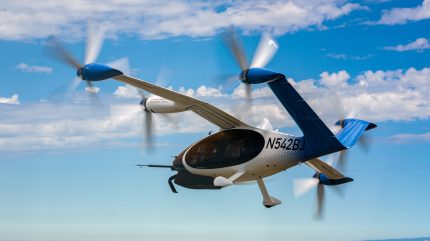
Joby Aviation, one of the industry’s leading electric vertical takeoff and landing (eVTOL) aircraft manufacturers, has completed a ‘landmark’ flight of a hydrogen-electric aircraft after flying more than 500 miles with the zero emissions vehicle.
Joby’s demonstrator aircraft is the first eVTOL with a hydrogen fuel cell system integrated into its propulsion systems to be forward flight tested, completing a 523-mile flight from its facilities in California with water as the only mid-flight emission.
The introduction of a hydrogen fuel system to the aircraft significantly expanded its range, with the same S4 aircraft completing a 155-mile flight in 2021 using only battery-electric power.
JoeBen Bevirt, founder and CEO of Joby, said: “Imagine being able to fly from San Francisco to San Diego, Boston to Baltimore, or Nashville to New Orleans without the need to go to an airport and with no emissions except water.
“That world is closer than ever, and the progress we’ve made towards certifying the battery-electric version of our aircraft gives us a great head start as we look ahead to making hydrogen-electric flight a reality.”
The hydrogen fuel cell system used on the demonstrator aircraft was developed by German company H2FLY and had already been used on a hydrogen-electric aircraft by Joby in September 2023, which was the first of its kind to be used in a piloted flight.
Electricity produced by the fuel cells on Joby’s hydrogen-eVTOL is used to power the aircraft’s six electric motors during flight, while the battery on board provides additional power during more intensive procedures such as take-off and landing.
The vehicle uses the same airframe and overall structure as Joby’s conventional eVTOL but features a 40kg liquid hydrogen storage tank alongside the fuel cell system, which remained 10% full after the landmark remotely piloted flight.
Development of the vehicle is part of a wider focus on hydrogen as a possible zero-emissions fuel for the aerospace industry, with Joby’s project backed by the US Air Force’s Agility Prime programme supporting eVTOL development.
Professor Josef Kallo, founder and CEO of H2FLY, said: “I’m incredibly proud of the teams that made this achievement possible. It’s a testament to excellent cooperation and perfectly illustrates the potential of fuel cell systems for a greener future in aviation.”
As highlighted by Bevirt, the successful flight continues Joby’s role as a leader in the urban air mobility industry, with the company likely to be the first to receive Federal Aviation Administration (FAA) approval for its eVTOL aircraft in the next 12-18 months.
The company’s recent successes include the unveiling of an all-in-one air taxi software which can be used in a similar way to convention ride share apps, and the conduction of the first electric air taxi flight in New York City.



